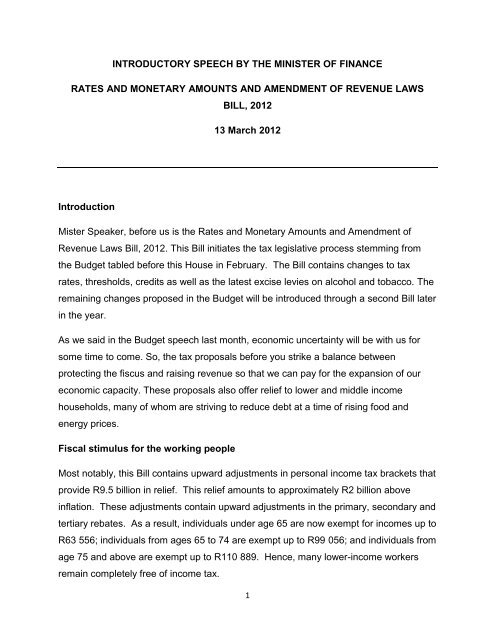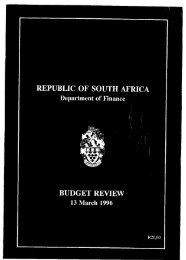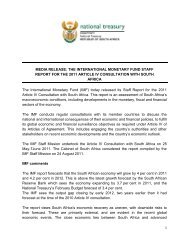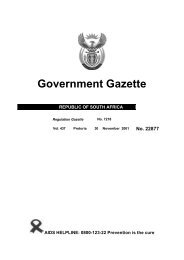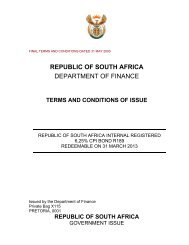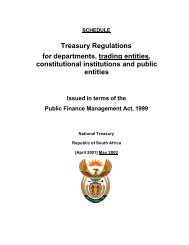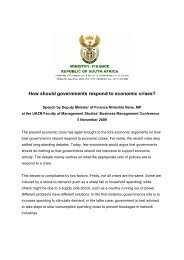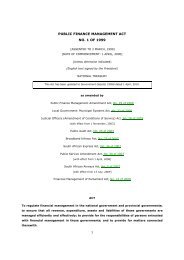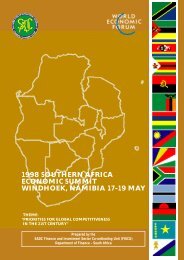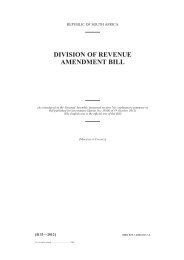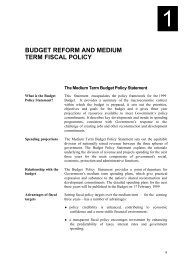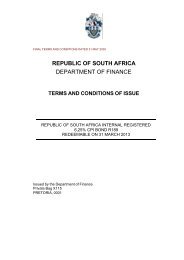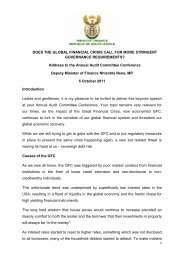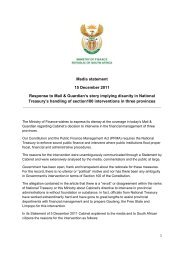INTRODUCTORY SPEECH BY THE MINISTER OF FINANCE ...
INTRODUCTORY SPEECH BY THE MINISTER OF FINANCE ...
INTRODUCTORY SPEECH BY THE MINISTER OF FINANCE ...
Create successful ePaper yourself
Turn your PDF publications into a flip-book with our unique Google optimized e-Paper software.
<strong>INTRODUCTORY</strong> <strong>SPEECH</strong> <strong>BY</strong> <strong>THE</strong> <strong>MINISTER</strong> <strong>OF</strong> <strong>FINANCE</strong><br />
RATES AND MONETARY AMOUNTS AND AMENDMENT <strong>OF</strong> REVENUE LAWS<br />
BILL, 2012<br />
13 March 2012<br />
Introduction<br />
Mister Speaker, before us is the Rates and Monetary Amounts and Amendment of<br />
Revenue Laws Bill, 2012. This Bill initiates the tax legislative process stemming from<br />
the Budget tabled before this House in February. The Bill contains changes to tax<br />
rates, thresholds, credits as well as the latest excise levies on alcohol and tobacco. The<br />
remaining changes proposed in the Budget will be introduced through a second Bill later<br />
in the year.<br />
As we said in the Budget speech last month, economic uncertainty will be with us for<br />
some time to come. So, the tax proposals before you strike a balance between<br />
protecting the fiscus and raising revenue so that we can pay for the expansion of our<br />
economic capacity. These proposals also offer relief to lower and middle income<br />
households, many of whom are striving to reduce debt at a time of rising food and<br />
energy prices.<br />
Fiscal stimulus for the working people<br />
Most notably, this Bill contains upward adjustments in personal income tax brackets that<br />
provide R9.5 billion in relief. This relief amounts to approximately R2 billion above<br />
inflation. These adjustments contain upward adjustments in the primary, secondary and<br />
tertiary rebates. As a result, individuals under age 65 are now exempt for incomes up to<br />
R63 556; individuals from ages 65 to 74 are exempt up to R99 056; and individuals from<br />
age 75 and above are exempt up to R110 889. Hence, many lower-income workers<br />
remain completely free of income tax.<br />
1
Income brackets are also increased for all groups so working persons will maintain a<br />
higher after-tax salary. Studies have repeatedly shown that the best way to promote<br />
savings is to provide salary relief so average workers have discretionary funds to save.<br />
It should also be noted that this relief for working employees has the added benefit of<br />
alleviating the wage burden on employers. Personal income tax relief should indirectly<br />
reduce the pressure for wage increases because taxpayers will have a greater level of<br />
after-tax income.<br />
In 2011, tax relief for medical aid scheme contributions was changed from a deduction<br />
system to a credit system. The purpose of this change to tax credits was to create<br />
greater equity between wealthy families and middle and lower income persons. Under<br />
this Bill, monthly credits are set at R230 for the main member, R230 for the spouse and<br />
R154 for each additional dependant. These monthly credits should greatly assist<br />
lower- and middle-income persons who are seeking protection from rising medical aid<br />
scheme costs.<br />
Small business<br />
Government continues to recognise the importance of small business as an engine for<br />
small business growth and economic growth. In pursuance of this aim, the Bill contains<br />
relief for small business corporations with the current 10 per cent rate dropping down to<br />
7 per cent. Up to R350 000 of taxable income will also be eligible for the small business<br />
corporation rate as opposed to the previous R300 000 maximum. This relief follows last<br />
year’s changes to the micro-business tax, which again sought to assist small<br />
businesses.<br />
New Dividends Tax<br />
As pledged several years ago, the new Dividends Tax will replace the Secondary Tax<br />
on Companies as from 1 April 2012. This change re-aligns the South African system for<br />
taxing dividends so as to be fully consistent with modern international tax practice. One<br />
important benefit of the new Dividends Tax is to properly separate the tax from<br />
company financials because dividends declared by companies better represent<br />
2
shareholder profits. The regime also has the added benefit of allowing pension funds to<br />
receive tax-free dividends, thereby allowing for greater pension fund growth.<br />
Increased Dividends Tax and Capital Gains Tax Rates<br />
Despite the above, some commentators are taking issue with the proposed increased<br />
rates associated with the Dividends Tax and the Capital Gains Tax. It is alleged that the<br />
new increased rates will unfairly target savings, especially to the detriment of middle<br />
and lower income persons.<br />
What these commentators fail to recognise is that the new Dividends Tax will cost the<br />
fiscus R1.9 billion because the new regime contains many new exemptions, including<br />
the exemption for pension funds. In order to replace these funds, it is necessary to<br />
raise the Dividends Tax rate to 15 per cent and to increase the rates of inclusions for<br />
capital gains, including the increased maximum effective rate of 13.3 per cent for<br />
individuals as opposed to the prior maximum effective rate of 10 per cent.<br />
Let me emphasise that relief from increased capital gains rates is again being made<br />
available for lower-and middle-income groups so that their savings can be shielded from<br />
this change. For instance, the annual capital gains exclusion will increase from<br />
R20 000 to R30 000. The exclusion on death will also increase from R200 000 to<br />
R300 000, and the exclusion for gains from the sale of homes will increase from<br />
R1.5 million to R2 million. All of these exclusions should be more than sufficient for<br />
most lower- and middle-income taxpayers who seek to set aside and grow their savings.<br />
Misconceptions about tax increases<br />
Some are suggesting that the Budget contains a significant overall increase in the tax<br />
burden. This is not true. As in prior years, additional revenues are expected as a mere<br />
by-product of reasonably anticipated growth. It is well-recognised that growth is the<br />
best way for Government to generate funds. At the end of the day, the Budget Review<br />
merely expects the aggregate tax burden to increase only marginally from 24.7 per cent<br />
to 25.0 per cent of GDP in 2011/12 and 2012/13 respectively.<br />
3
Road levies and earmarking<br />
With much being written about toll roads, the latest suggestion by some is to earmark<br />
fuel levies against road construction only. Allow me to remind us that earmarked taxes<br />
tend to fragment and complicate the tax system and allow departments and agencies to<br />
escape the discipline of the budget process. In addition, dedicated funding bypasses the<br />
important process of prioritisation that must occur through the general budget process.<br />
Most notably, those asking for the earmarking of the general fuel levy should be careful<br />
what they wish for. The total funds spent on roads and public transport is more than<br />
what is collected from the general fuel levy. For the 2012/13 fiscal year, Government<br />
has virtually doubled the amount budgeted for roads and transport. It has budgeted an<br />
amount of over R70 billion for roads and transport, consisting of contributions to<br />
SANRAL, provincial roads, municipal roads and to rail and bus capital expenditures and<br />
subsidies. On the other hand, the gross expected revenue from the general fuel levy is<br />
only about R42.8 billion. Of this amount, R1.5 billion is set aside for the fuel pipeline<br />
and R9 billion will go to metropolitan municipalities as compensation for the scrapping<br />
for the RSC levy. In sum, earmarking will mean that fuel levies will have to increase by<br />
another R16.5 billion to cover the perceived shortfall equivalent to an increase of almost<br />
one rand in the fuel levy – a sum motorists can barely afford. We have, instead, funded<br />
this from general tax revenue!<br />
Alcohol and tobacco<br />
As part of the on-going effort to curb substance abuse, the rates on tobacco products<br />
will increase between 5 and 8.2 per cent. The rates on alcohol products will increase<br />
between 6 and 20 per cent.<br />
4
In summary, the tax Bill before you contains a careful developed package which<br />
supports government’s objective to maintaining fiscal revenues for Government<br />
priorities, provide for fiscal support for growth and job creation and strive for fiscal<br />
consolidation in the medium term. This is what is required at a time of on-going global<br />
economic uncertainty.<br />
This is what is required to ensure we all pay our fair share. We want to assure our<br />
taxpayers that we continue daily to ensure that your money is spent well and we obtain<br />
value for money and minimise wastage.<br />
I hereby table the Rates and Monetary Amounts and Amendment of Revenue Laws<br />
Bill, 2012.<br />
5


